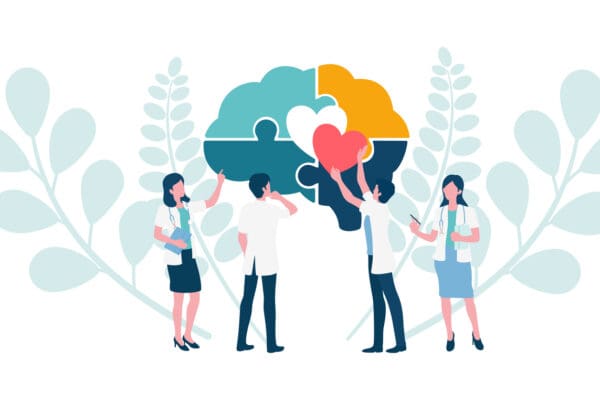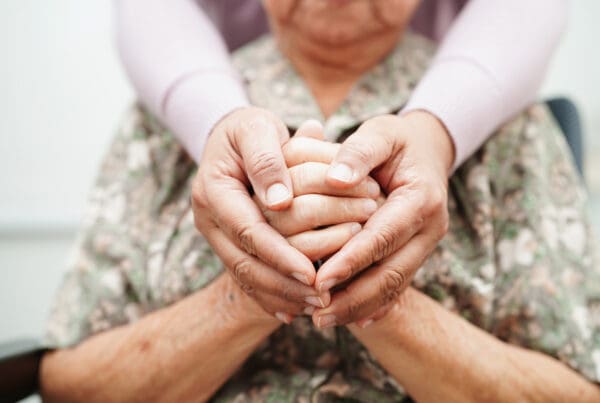Francesca Falzarano is an assistant professor of gerontology at the USC Leonard Davis School. Her research is inspired by her personal experience as a caregiver to her parents and explores how to improve the mental health and well-being of family caregivers, including through the use of technology.
Quotes from this episode
On young caregivers
“I think right now it’s estimated that five and a half million individuals are under the age of 18 are caring for a parent or some family member with chronic illness, mental health issues, dementia-related illnesses, and other age-related impairments. So, this is something that’s becoming more and more pervasive, and the needs of adolescents are going to vary extremely, and they’re going to be extremely different compared to what my needs were as a caregiver versus what a spouse’s needs are going to be.”
“I talked to a ton of first-generation Gen Z caregivers who have really been at the forefront of their loved one’s healthcare interactions since they were young teens, just translating and digesting information that a doctor is saying and communicating it to the rest of the family. So there’s a lot of burden that we’re placing on these individuals without simultaneously understanding what their unique needs are.”
On dementia caregiving
“If you think about dementia itself, it’s got a very unpredictable disease course where most of that time is spent in dependency, and you have a variable lifespan anywhere from four to 20 years. So what we are learning is that there are so many things beyond just the caregiver’s direct care tasks beyond what they’re just doing in the care environment, like bathing or dressing or feeding that go into the caregiving role that individuals are not getting support for, whether that’s managing finances, making end of life decisions, navigating the labyrinth that is Medicaid and Medicare, talking to healthcare professionals. It’s essentially all of these roles and responsibilities that unfold over time is what we would dedicate one expert to take care of in our, in our school or department. And we’re expecting caregivers to have learn on the fly and typically they’re getting support and help in crisis.”
“We learned that caregivers are expecting or anticipating the information, about what to expect about what the disease will look like and about how their responsibilities are going to unfold from the primary care physicians. But as our, my caregiver participants have said, it’s a situation of diagnose and adios. So there’s very little follow up, there’s very little ongoing support that’s provided.”
On long-distance caregivers
“Long-distance caregivers… their biggest challenges that they face is that intersection with the formal care system, being able to get adequate communication and information about their loved one’s care. And really just feeling involved and being able to adequately manage all of the responsibilities involved in keeping someone safe, but also in terms of their doctor’s appointments and their medications and the people that are physically providing care.”
“I think we need to do a better job at educating the clinicians and the care providers that just because an individual is not in person does not mean they’re not a caregiver and they’re not really involved in all of the work that goes into that.”
“The prevalence of dementia is just going to continue to increase and the likelihood that we’ll have to provide care for somebody we love is very high. The likelihood that we’ll have to do it more than once is also very high. And so really kind of my goal is to normalize caregiving the way we normalize parenting the way we provide all the resources and follow up for somebody who’s going on maternity leave and about to give birth to a child. And that we need to start looking and viewing caregiving in a similar way and normalizing it and reducing the stigma as much as possible so we’re not embarrassed or ashamed of our circumstances, but we can use it to empower ourselves to get the support we need.”
On technology
“Technology has really opened a lot of doors, particularly in research and behavioral interventions to kind of alleviate stress and poor psychosocial outcomes. We’ve finally kind of looked at technology as a way to broaden opportunities for these individuals who might not be able to leave the house otherwise.”
“I think technology can come in because a lot of the issues with the healthcare system and connecting caregivers to formal supports is we don’t have enough human bodies in a room to take the time to assess each caregiver to give them the personalized support. We don’t have the staffing, the time, just the capacity and technology can really help us improve and personalize that support beyond human capability. And so if I go on Netflix and Netflix can recommend what I want to watch next, Amazon can tell me what I want to buy next. I can go online and use AI to pick out an insurance plan, to pick out what my skincare routine is or my birth control. Why are we not using technology to give more tailored, targeted and precise support to caregivers?”
“I think technology can help bring their desire for personalized caregiving navigation to fruition. And I also think it could bring the possibility of a one-stop shop where caregivers can get educated, find resources, connect with other caregivers, and not struggle to find the information and help they need. I think that becomes a lot more feasible when we bring in technology.”
“I’m working on two tech-focused research projects right now. One of them is kind of, alluding to what I was just talking about, is the development of a self-assessment and referral platform where caregivers can get a sense of what areas they need the most support in. And using AI and machine learning to generate targeted referrals to kind of make the pipeline between identification, assessment and referral more seamless.”
“I think this is another great thing that we can leverage technology for, is how do we engage people with dementia as well? And so a second research project I’m conducting with my colleagues at Weill Cornell, is a reminiscence therapy web-based platform where, and reminiscence therapy is pretty widely used in clinical settings. There’s not as much empirical research done on reminiscence therapy, but we know that it helps the person with dementia recall memories. We know that music and all of these different interactive, prompts and activities done within reminiscence therapy could be really therapeutic for care recipients. And so, and typically in institutional settings they’re kind of very general and it’s facilitated by a clinician or a therapist in a nursing home. And we are creating right now a reminiscence therapy web app where caregivers are facilitating these activities and documenting meaningful memories with the person with dementia. It’s something that they, they can do together. It’s something that they can engage in that can promote relationship quality, help with feelings of grief that are so pervasive in both caregivers and patients.”





